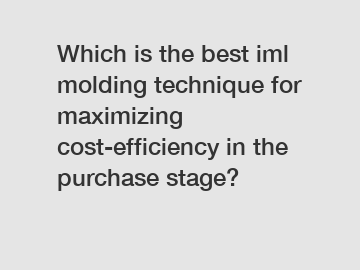Which is the best iml molding technique for maximizing cost-efficiency in the purchase stage?
Which is the best IML molding technique for maximizing cost-efficiency in the purchase stage?
In-Mold Labeling (IML) is a popular decorative technique used in the plastics industry. It involves placing a pre-printed label inside the mold before injecting the plastic resin, resulting in a permanent label that becomes an integral part of the final product. IML offers several advantages, such as enhanced aesthetics, durability, and resistance to wear and tear. However, when considering cost-efficiency in the purchase stage, it becomes crucial to select the best IML molding technique that can optimize costs without compromising quality. In this article, we will explore different IML molding techniques and determine which one is the most suitable for maximizing cost-efficiency.
1. Traditional IML Molding Technique:

The traditional IML molding technique involves using a flat label during the injection molding process. This technique is cost-effective for large production volumes due to its high speed and efficiency. However, it may not be the most cost-efficient option for smaller production runs as it requires the use of expensive injection molds and specialized equipment.
2. Injection-Compression Molding Technique:
The injection-compression molding technique is a variation of traditional IML that offers improved cost-efficiency for smaller production runs. It involves slightly compressing the mold during the injection process, ensuring more precise label placement and reducing material waste. This technique helps optimize material usage and minimize costs, making it an attractive option for both large and small production volumes.
3. In-Mold Label Thermoforming (IMLT):
In-Mold Label Thermoforming is another technique used in the IML process that offers cost-efficiency benefits for certain applications. Unlike injection molding, IMLT involves heating the plastic sheet before placing it in the mold, allowing it to conform to the desired shape. This process eliminates the need for injection molds, making it a cost-effective option for complex shapes and smaller production runs. However, it is worth noting that IMLT may not be suitable for high-production volumes due to the slower cycle times associated with thermoforming.
4. In-Mold Film Insert Molding (IMFI):
IMFI is a relatively new and innovative IML technique that combines the advantages of traditional IML with additional cost-efficiency benefits. It involves using a pre-formed film insert instead of a flat label, reducing material waste and simplifying the manufacturing process. IMFI offers flexibility in design, faster cycle times, and reduced costs, making it an attractive option for various applications and production volumes.
In conclusion, when it comes to maximizing cost-efficiency in the purchase stage of an IML project, there are several techniques to consider. The traditional IML molding technique is efficient for large production runs, while the injection-compression molding technique offers cost-saving benefits for both small and large volumes. In-Mold Label Thermoforming is a cost-effective option for complex shapes and smaller production runs. Lastly, In-Mold Film Insert Molding provides a combination of traditional IML advantages with additional cost-efficiency benefits. The choice of the best technique depends on the specific requirements of each project, including production volume, shape complexity, and budget.
If you are looking to implement an IML project or require further information on the best cost-efficient molding technique for your specific needs, do not hesitate to contact us. Our team of experts is here to assist you and provide the necessary guidance to ensure a successful and cost-effective IML project.
If you want to learn more, please visit our website Margarine container manufacturers, 125g yogurt Container, 125ml IML Ice Cream Container.
274
0
0

Comments
All Comments (0)